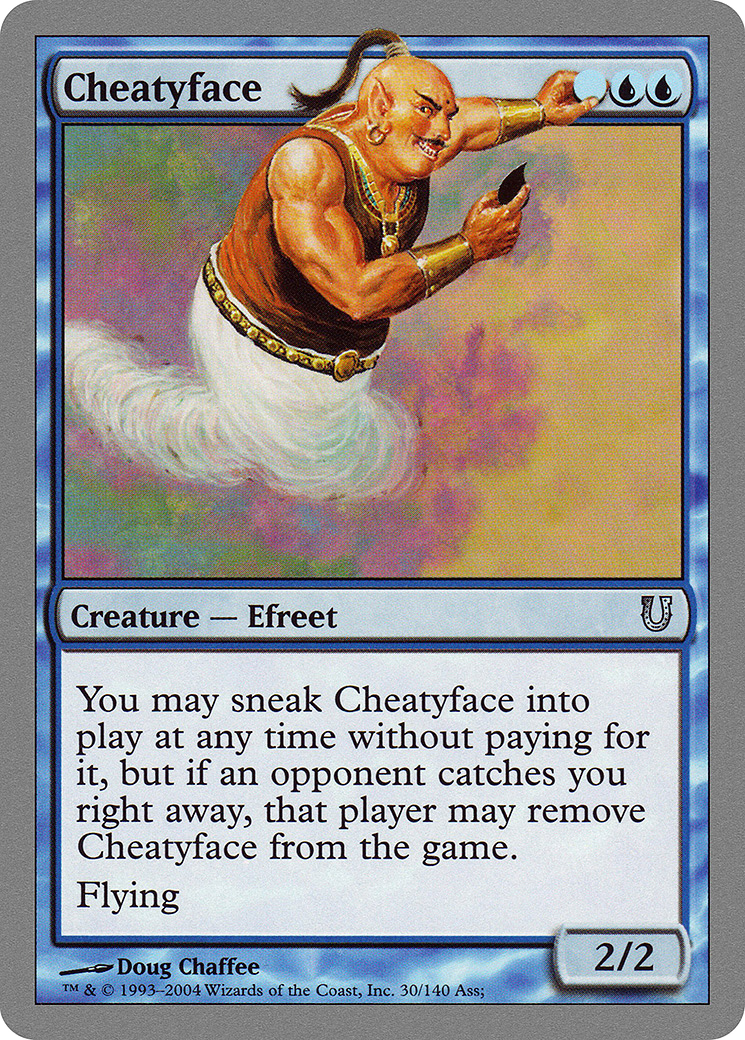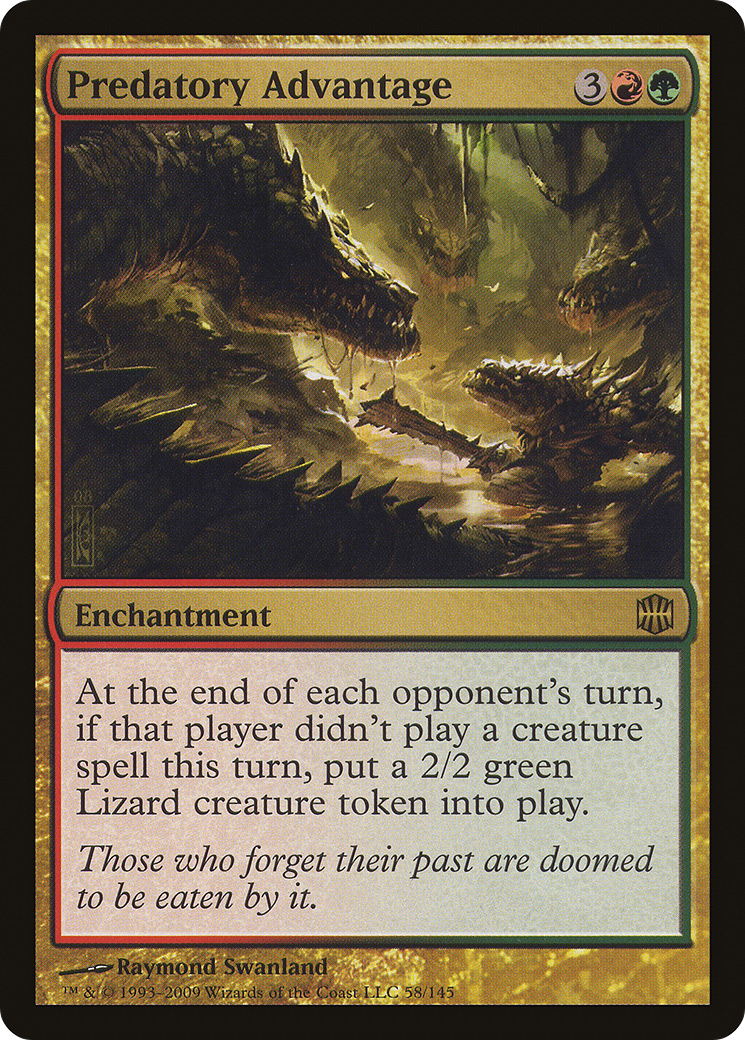What is "Cheating"?
The Infraction Procedure Guide gives us three criteria that must be met in order for an action to be considered "Cheating".

- The player must break a rule.
- The player must be aware that they are doing something illegal.
- The player must be attempting to gain advantage from their action.
If all three of these criteria are satisfied, the action is Cheating. If any of them are not satisfied, the action is not Cheating.
The player must break a rule
This one is pretty straightforward. The Magic Comprehensive Rules and Magic Tournament Rules tell us what is and isn't allowed in Magic tournaments. In order for something to be Cheating, one of those documents must have been violated. (If a specific tournament organizer implements their own additional rules, breaking those can also be Cheating.)
This is important. Cheating must actually be a rule violation. It's not Cheating if a player is just "acting shady", or might break a rule in the future, or does something the judge or the other players don't like. It's only Cheating if something illegal actually happened.
In practice, there are a few rules that we don't care about. Technically, players are required to bring a pen with them to a Magic tournament in order to track life totals. If they do this intentionally and maliciously, are we really going to disqualify them? Eh, probably not. But there is never a situation where a player who has not broken a rule should be disqualified for Cheating.
The player must be aware that they are doing something illegal
This is the clause that ensures Cheating is reserved for acts of malice, and not just honest mistakes. Magic is a complicated game, and players break rules accidentally all the time.
The importance or impact of the rule that was broken is not relevant. What matters is the player's intention; did they know that what they were doing was not allowed?
This clause means that there is no physical or game action that is guaranteed to be Cheating. Any phrase of the form "doing [game action] is Cheating" is false. A correct statement would be "doing [thing] is illegal", and then whether they receive a Disqualification for Cheating or a lesser penalty for an honest mistake depends on what the judge believes their intention to have been.
In Magic, ignorance is an excuse.
The player must be attempting to gain advantage from their action
This is the weird one. The main reason this is here is to prevent players being disqualified for wanting to be nice or expedient.
For example, say you're playing against a very new player in a tournament, and doing pretty well. You don't want to make them feel bad by crushing them too badly, so you put one of your creatures into the graveyard when it shouldn't have died, and they don't notice. You've done something illegal, and you knew it was illegal, but it wasn't to give you an advantage, so it's not Cheating.
Similarly, it's not Cheating if a player notices an error from their opponent that benefits that opponent, and chooses to not call attention to it because they think that it doesn't matter and they don't want to waste time.

But there's a problem here. What does "advantage" actually mean? Taken literally, all actions a player takes are intended to gain them some advantage; people don't intentionally take actions that are disadvantageous to them! A player who chooses not to point out that their opponent's creature should have died is gaining advantages like "I get to play a more challenging and therefore more enjoyable game" and "I'm happier now that my opponent is going to have more fun".
Maybe it just means advantages in the tournament? A higher probability of winning a match, getting more prizes, avoiding a penalty, etc. But this also fails. Some examples:
- A player knows they're not supposed to gamble on a Magic tournament, but does it anyway.
- A player is losing a match and is frustrated at their opponent, so they concede the match and falsely claim to a judge that the opponent drew an extra card just to get them in trouble.
- A counterfeit manufacturer decides to test out the quality of their counterfeits by entering a tournament with a deck of counterfeits.
None of these actions helps the player within the tournament in any way, yet clearly these players should be disqualified.
So I think the best way to interpret this line is that it applies to any advantage, even vague intangible ones, but only if it doesn't fall into the general category of "trying to be nice to other people and/or expedite the tournament". While a little inelegant, this seems to be the best fit for the reason that clause is in the IPG.
Definition vs. investigation
Something that trips a lot of people up is the difference between whether a player is Cheating vs. whether the judge believes they're Cheating. In reality, judges don't have access to the player's intentions, and sometimes they have incomplete information about what happened in the game too, so we have to take our best guess.
For example, if a player successfully stacks their deck to have the perfect opening hand because nobody was watching them shuffle, that player probably won't be Disqualified, but they did still Cheat. There are two entirely separate concepts here:
- Given a "god's eye view" of the situation, where you have an objective description of exactly what happened and what the player was thinking as they did it, is the situation Cheating?
- Given only limited information about the situation, such as a real judge would have at a real event, what's the most reasonable conclusion for the judge to draw?
The first question is what this article addresses. The second question is much more complicated, and many other articles have been written about it.
Examples
These criteria are simple in theory, but it can be hard to recognize in practice when they do or don't apply, so here are some example situations to let you test your intuition.
Question #1
A player is losing the game and desperately needs to draw a removal spell. While their opponent isn't looking, they surreptitiously draw an extra card from their deck.
This is Cheating, obviously.
Question #2
A player notices that their opponent forgot to draw a card this turn and chooses to say nothing because they really need their opponent to not draw a boardwipe in order to win the game.
There's not enough information here to know whether this is Cheating or not. A rule has been broken (players must call attention to their opponent's errors), and the player was doing it to gain an advantage, but it's not specified whether they knew it was illegal. Some players (incorrectly) think that they're only responsible for their own cards, and that it's ok to let their opponent make mistakes. If that's the case, then this isn't Cheating.
Question #3
A player mana weaves their deck, then shuffles it well afterwards, believing that this helps them draw better cards.
Not Cheating. The deck was shuffled properly before being presented to the opponent, so no rule has been broken.
Question #4
A player accidentally forgets to put a -1/-1 counter on their creature. They realize this in the next game and call for a judge.
Not Cheating. A game rule was broken, but it was unintentional.
Question #5
A player is given an incorrect ruling by a Floor Judge. The player knows it's incorrect, but it's in their favor, so they don't do anything about it.
Not Cheating. Judge rulings are generally assumed to be correct, and players are not required to argue with the judge if they don't want to.
Question #6
A player is playing Serum Visions. They decide that when they cast it, they'll scry before drawing and explain that they're a Legacy player and are used to Preordain. They never draw Serum Visions in any of their games.
Not Cheating. The player never did anything illegal.
Question #7
A player loses their match 1-2, but submits the result 2-1, knowing that their opponent is a new player who probably won't notice their match points being wrong.
This is Cheating. A rule was broken, the player knew it was a rule, and it was done to gain a clear advantage.
Question #8
A player borrows a Burn deck from their friend. In a game that their friend is watching, they say "you should attack with Eidolon". The opponent calls for a judge, and after the friend is asked to stop spectating the match, the player attacks with Eidolon.
Not enough information to know. If the player planned this out with their friend in advance, then that's Cheating. But if they didn't know their friend was going to give them advice, that's not the player's fault, and they haven't broken any rule.
Question #9
A player notices that their opponent is at 3 life. It's their only out to win the game, so they knowingly and intentionally decide to cast Lightning Bolt, hoping their opponent scoops.
This is not Cheating; casting Lightning Bolt is in fact legal. The player has knowingly taken an action to attempt to gain an advantage, but no rule was broken.
Question #10
A player casts Abrupt Decay targeting their opponent's Rest in Peace. They think the Abrupt Decay should go to exile, but it's much better for them if it goes to the graveyard, so they put it there hoping the opponent doesn't notice.
Not Cheating. Abrupt Decay is supposed to end up in the graveyard, since the Rest in Peace is gone by the time Abrupt Decay is leaving the stack. The player may have intended to Cheat, but they never actually did anything illegal, so they never Cheated.
Question #11
A player notices that their opponent didn't gain any life from their Soul Warden. The player has lethal on board, so they choose to not say anything.
Not Cheating. Triggered abilities are an exception to the normal rules, and players are not required to point out when their opponent misses one. (This is only for triggers; anything else the opponent messes up does need to be called out.)
Question #12
A judge asks a player what they ate for breakfast. The player is embarrassed to admit that they ate a bunch of chocolate bars, so they lie and say they ate a healthy breakfast instead.
Lying to a judge is technically illegal, but we really don't care about stuff like this.
Question #13
A player receives a ruling from a floor judge. They think it's correct, but it's going to make them lose the game, so they appeal anyway.
Not Cheating. Players are always allowed to appeal any ruling. However, if the player says something like "I'm pretty sure it doesn't work that way", then they've lied to a judge and that could be Cheating. But the appeal itself is fine.
Question #14
A player needs to discard a card randomly. They lay out their hand face down, and the opponent chooses one. The player looks at the card, sees that it's the one card they really wanted to keep, and calls for a judge to ask if they can roll a die instead.
Not Cheating; players are always allowed to call a judge and ask a question.
Question #15
A player notices that their opponent has committed a minor error, and is worried that if they point it out, the opponent will think they're being rude, so they don't mention it.
Not Cheating. They've broken a rule by not mentioning an error, and they presumably knew this was not allowed, but they're just trying to be nice to the opponent. (That said, they probably still should call a judge.)